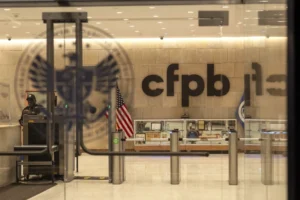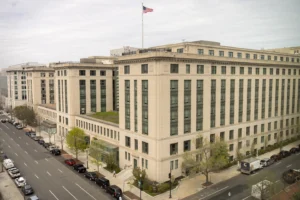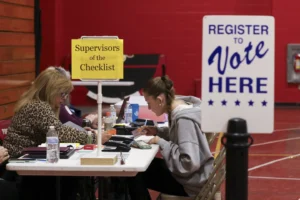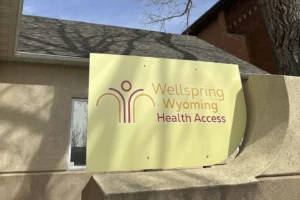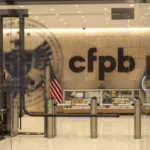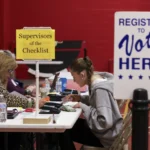Biden Asks Congress to Expand Banking Regulations as Wyoming Lawmakers Blast Administration’s Actions
Experts stress that Wyomingites’ financial assets are safe, but lawmakers still want answers on alleged oversight failures
- Published In: Politics
- Last Updated: Mar 18, 2023
n remarks from the White House on Monday, President Joe Biden sought to contain the damage from the failure of several banks, promising that "Americans can have confidence that the banking system is safe." (AP Photo/Andrew Harnik)
By Jacob Gardenswartz
Special to the Wyoming Truth
Amid the ongoing fallout over the collapse of Silicon Valley Bank (SVB) in California and Signature Bank in New York late last week, President Joe Biden on Friday called on lawmakers in Washington to expand the federal government’s ability to regulate failed financial institutions.
“When banks fail due to mismanagement and excessive risk taking, it should be easier for regulators to claw back compensation from executives, to impose civil penalties and to ban executives from working in the banking industry again,” Biden said in a White House statement. “Congress must act to impose tougher penalties for senior bank executives whose mismanagement contributed to their institutions failing.”
But Wyoming’s all-Republican delegation appears less than willing to heed Biden’s requests, blaming the banks’ problems not on a lack of regulatory tools but on the federal government’s alleged failures to provide proper oversight.
“These events are the result of some federal bank regulators being asleep at the wheel and shockingly poor management by an isolated number of banks,” Sen. Cynthia Lummis (R-Wyo), said in a statement to the Wyoming Truth earlier this week. “I will continue to be engaged on this issue and ensure that robust Congressional oversight is being performed on our banking regulators.”
Despite the banks’ turmoil, local and national experts alike have stressed that most Americans’ assets remain safe, and discouraged consumers from giving into the impulse to withdraw all their funds. That’s especially true in Wyoming, where most banks have far fewer uninsured holdings.

“The banking system overall and Wyoming banks are safe, sound and resilient,” Scott Meier, president and CEO of the Wyoming Bankers Association, said in a statement. “In stark contrast to the nation’s largest banks, Wyoming’s community banks operate under an entirely different business model — one that is based locally and is relationship focused.”
Still, the stress on the banking sector complicates a global economy already facing several challenges, among them stubborn inflation and high interest rates, and further raises the stakes as lawmakers debate the 2024 federal budget and whether and how to raise the debt ceiling.
SVB’s downfall and a ‘bail out’ back-and-forth
The banking system’s recent turmoil can be attributed to a variety of factors, but the basic facts stand: it all starts with SVB, once the nation’s 16th-largest bank which catered predominantly to venture capital and private equity clients in the tech sector — start-up companies and those who invest in them. When business was good, the bank thrived. But as many tech companies began to show signs of financial struggles, so, too, did their bank.
Like all banks, SVB invested its clients’ money in a variety of holdings, among them securities like Treasury bonds. But as the Federal Reserve continued to hike up interest rates to combat inflation, SVB’s bonds were suddenly worth significantly less. That coupled with the broader decline in tech investing meant the bank faced a cash flow issue — it might have invested more money than its clients had deposited.
On March 8, SVB’s parent company announced it was selling off a number of shares at a nearly $2 billion loss. The move was intended to shore up the bank’s balance sheet as a means of calming shareholders.
Instead, it did the opposite. Panic soon spread throughout social media, spilling over to the stock market where the bank’s stock plummeted 60%. On March 10, amid a run on deposits, SVB became the largest financial institution to fail since the Great Recession in 2008, forcing the Federal Deposit Insurance Corporation (FDIC) to take over management. Just two days later, amid a run of its depositors, regulators overtook Signature Bank as well.
Over the weekend, Biden administration officials raced to quell the damage from spreading to other institutions, as depositors worried whether and when they’d be able to recover their funds. Of particular issue was the fact that over 90% of SVB’s deposits exceeded $250,000 and thus were not FDIC insured, a much higher proportion than is the case for most banks.
On March 12, federal regulators jointly announced they’d make a “systemic risk exception” to the FDIC rules for SVB and Signature Bank, guaranteeing all depositors’ funds regardless of their size. Individuals could have access to all their money as early as Monday.
In remarks from the White House that day, Biden stressed that his administration’s move was not a bailout. “No losses will be borne by the taxpayers,” he said, instead noting the money would come from fees banks paid into the Deposit Insurance Fund.
But Wyoming lawmakers remain unconvinced. Appearing on Fox Business earlier this week, Lummis described the move to guarantee deposits as a “mistake,” arguing smaller banks will now bear the cost of bailing out a larger, poorly-managed institution.
“There were a lot of incentives for risk-takers to bank with SVB. Because of that, SVB should be allowed to fail. And most people who put their money at risk there should have to eat the consequences,” Lummis said.
Smaller community banks “shouldn’t have to bail out these banks that were taking much higher risk,” Lummis added on CNBC.
Asked about the Biden administration’s claim that taxpayers wouldn’t bear any costs from the government’s interventions with SVB and Signature Bank, Rep. Harriet Hageman (R-Wyo.) was similarly skeptical.
“[G]overnment has no money that does not come from the taxpayers, so it will absolutely be at their expense,” she said in a statement to the Wyoming Truth.
Sen. John Barrasso (R-Wyo.) has stayed mum on the banking issues and did not participate in a Senate Finance Committee hearing with Treasury Secretary Janet Yellen on Thursday. A representative for his office told the Wyoming Truth he was with his wife, who is undergoing treatment for cancer.
Are ‘woke’ policies or deregulation to blame?
As lawmakers from opposing parties seek to place blame for SVB’s demise, two contrasting explanations have been put forward.
According to some conservatives — Hageman among them — SVB’s failure can be attributed to the bank’s so-called “woke” policies, with critics pointing to the bank’s pursuit of environmental and social governance (ESG) investing and diversity, equity and inclusion initiatives as the key cause of its financial ruin.
SVB’s failure “should come as no surprise, but it should be seen as a warning for others that choose flawed investment tactics. Woke-ism that permeates our society will always fail,” Hageman told the Wyoming Truth.
But there’s little if any evidence that SVB’s social policies played any role in its financial troubles. Nothing in the bank’s public financial disclosures shows any negative financial impact of its diversity initiatives, the Associated Press reported.
On the other side of the aisle, some Democrats have alleged that a 2018 rollback of federal banking regulations is to blame, as it exempted many banks from more scrutiny. The deregulations, which garnered significant support from both parties and was signed into law by former President Donald Trump, raised the limit governing how large banks must be before they received increased regulatory scrutiny. Though in the original law, banks with over $50 billion in assets could be scrutinized, the change raised that threshold to $250 billion.
On Friday, Biden urged Congress to again lower that limit to enable more oversight of institutions like SVB and Signature Bank. Earlier in the week, however, Lummis argued the 2018 deregulations “didn’t have anything to do” with the bank’s problems, insisting any insinuation as such was “subterfuge trying to change the subject.”
Indeed, many financial experts have noted that SVB’s problems were unique to its situation and highly homogenous client base.
“It is sad to see any bank fail and for depositors to suffer any uncertainty about the safety of their deposits,” Meier said. “What happened with SVB and Signature Bank, however, are incredibly unique situations.”

